Her ‘Aryan’ face made Marianne Hoppe (1909-2002) a popular Ufa star and a darling of the Nazi elite. She was Germany's best-paid actress of the 1930s and 1940s. After the war she labelled this period as a ‘black page in her golden book’, and she evolved into the Queen of the German contemporary theatre. Her career spanned eight decades.

German postcard by Film-Foto-Verlag, no. G 119. Photo: Binz, Berlin.
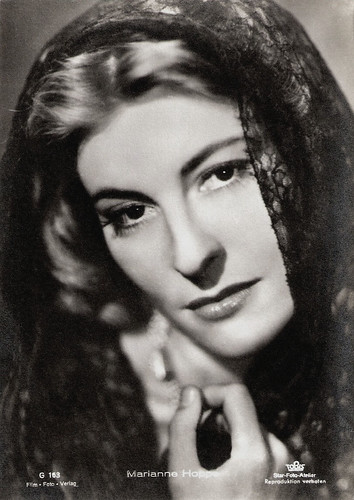
German postcard by Film-Foto-Verlag, no. G 163, 1941-1944. Photo: Star-Foto-Atelier / Tobis.

German postcard by Ross-Verlag, no. A 2498/1, 1939-1940. Photo: Baumann / Ufa.
Marianne Stefanie Paula Henni Gertrud Hoppe was born in Rostock in 1909. Her family were wealthy land owners and she was initially privately educated on her father's estate Felsenhagen in Mecklenburg.
Later she attended school in Berlin and in Weimar, where she took private lessons from the actress Lucie Höflich. Hoppe first performed at 17 as a member of Berlin's Deutsches Theater under legendary director Max Reinhardt.
Her film debut was in Judas of Tyrol/The Judas of Tyrol (Franz Osten, 1933) starring Fritz Rasp. Her leading role in Der Schimmelreiter/The Rider of the White Horse (Hans Deppe, 1933) made her famous almost overnight.
Other of her popular Ufa-films were Schwarzer Jäger Johanna/Black Fighter Johanna (Johannes Meyer, 1934), Wenn der Hahn kräht/When the Cock Crows (Carl Froelich, 1936), the Oscar Wilde adaptation Eine Frau ohne Bedeutung/A Woman of No Importance (Hans Steinhoff, 1936).
Marianne Hoppe also appeared in Der Herrscher/The Ruler (Veit Harlan, 1937) featuring Emil Jannings. She later excelled in the melodramas of Helmut Käutner, like the home-front morale-booster Auf Wiedersehen, Franziska!/Goodbye, Franziska! (1941), and Romanze in Moll/Romance in a Minor Key (1942).

German postcard by Ross-Verlag, no. A 3021/1, 1941-1944. Photo: Greinert.

German postcard by Film-Foto-Verlag, no. A 3755/1. 1941-1944. Photo: Star-Foto-Atelier / Tobis.

German postcard by Film-Foto-Verlag, no. A 3890/1, 1941-1944. Photo: Star-Foto-Atelier / Tobis.
In 1935 Marianne Hoppe was hired by the controversial German actor and director of the Prussian State Theatre under the Third Reich, Gustav Gründgens. Her ‘Aryan’ face and boyish figure made her a darling of the Nazi elite.
The Svengali-like Gründgens controlled her career, both on-stage and in films like Capriolen/Love in Stunt Flying (1937) and the 'Effi Briest' adaptation Der Schritt vom Wege/The False Step (1939) with Karl Ludwig Diehl.
They were married from 1936 to 1946. Years later she stated: "He was my love, but never my great love, that was work." Characters in the film Mephisto (István Szabó, 1981) are based on them.
Hoppe later made no secret of her contacts with the Nazi elite in the 1930s and 1940s, including being invited to dinner by Adolph Hitler. She labelled this period as "the black page in my golden book".
During her time acting at the home of the Prussian State Theatre, the Schauspielhaus, Hoppe developed her analytical approach to acting, which she stated consisted of her "taking apart every sentence" and giving the use of language a brilliance. This method was to be associated with Hoppe throughout her working life.
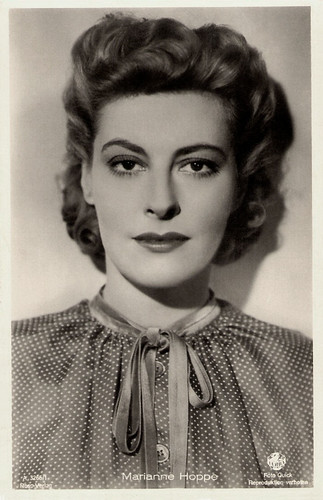
German postcard by Ross Verlag, nr. A 3266/1, 1941-1944. Photo: Quick / Terra.
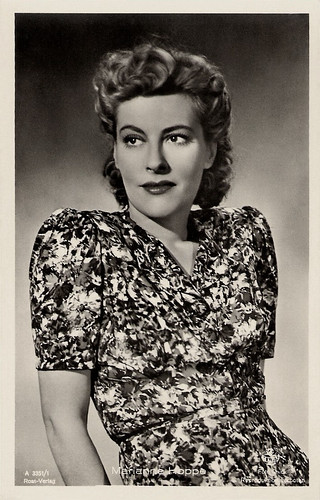
German postcard by Ross Verlag, no. A 3351/1. Photo: Quick / Terra.
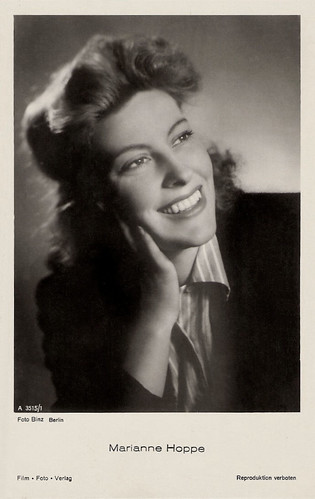
German postcard by Film-Foto-Verlag, no. A 3515/1, 1941-1944. Photo: Binz, Berlin.
After the war, Marianne Hoppe worked briefly in a Berlin refugee camp. She appeared in films like Das Verlorene Gesicht/Secrets of a Soul (Kurt Hoffmann, 1948), and Schicksal aus zweiter Hand/Second-hand Future (Wolfgang Staudte, 1949).
In 1950 she had great success in the theatre as Blanche Dubois in Tennessee Williams's 'A Streetcar Named Desire'. She also appeared extensively on television and played in films like Der Mann meines Lebens/The Man of My Life (Erich Engel, 1954), the Edgar Wallace adaptation Die seltsame Gräfin/The Strange Countess (Josef von Báky, 1961), and the Karl May Western Der Schatz im Silbersee/Treasure of Silver Lake (Harald Reinl, 1962) starring Lex Barker and Pierre Brice.
Increasingly she played avant-garde roles, written by authors such as Heiner Muller and Thomas Bernhard. The latter became her partner in private life as well. She was a favourite of the young and iconoclastic directors Claus Peymann, Robert Wilson and Frank Castorf.
Among her last films are Falsche Bewegung/The Wrong Move (Wim Wenders, 1975) with Rüdiger Vogler and Hanna Schygulla, and Schloss Königswald (Peter Schamoni, 1988), for which she won the Bavarian Film Award for Best Actress.
Marianne Hoppe died in Siegsdorf, Bavaria, in 2002, aged 93. Her final stage performance had been in Bertolt Brecht's 'Resistible Rise of Arturo Ui', in December 1997. She had an illegitimate son, Benedikt Johann Percy, with British journalist Ralph Izzard. The documentary Die Königin - Marianne Hoppe/The Queen (Werner Schroeter, 2000) deals with her moving life and career.

German collectors card in the series 'Vom Werden deutscher Filmkunst - Der Tonfilm', album no. 11, picture no. 85, group 44. Photo: Ufa / Ross Verlag. Marianne Hoppe and Hans Schlenck in Heideschulmeister Uwe Karsten/The Country Schoolmaster (Carl Heinz Wolff, 1933).

German postcard, no. E 60. Photo: Constantin. Still from Der Schatz im Silbersee/Treasure of Silver Lake (Harald Reinl, 1962) with Karin Dor.
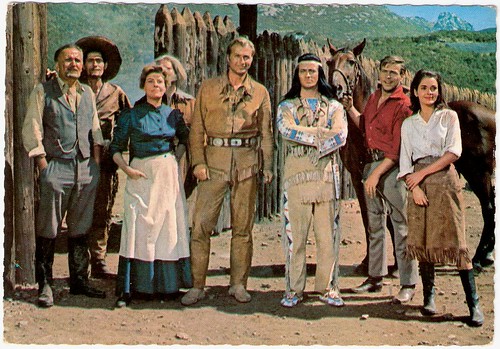
German postcard, no. ED 62. Photo: Constantin. Still from Der Schatz im Silbersee/Treasure of Silver Lake (Harald Reinl, 1962).
Sources: Thomas Staedeli (Cyranos), Hans J. Wollstein (All Movie - page now defunct), Wikipedia, and IMDb.
This post was last updated on 17 October 2024.

German postcard by Film-Foto-Verlag, no. G 119. Photo: Binz, Berlin.

German postcard by Film-Foto-Verlag, no. G 163, 1941-1944. Photo: Star-Foto-Atelier / Tobis.

German postcard by Ross-Verlag, no. A 2498/1, 1939-1940. Photo: Baumann / Ufa.
Home-front morale-booster
Marianne Stefanie Paula Henni Gertrud Hoppe was born in Rostock in 1909. Her family were wealthy land owners and she was initially privately educated on her father's estate Felsenhagen in Mecklenburg.
Later she attended school in Berlin and in Weimar, where she took private lessons from the actress Lucie Höflich. Hoppe first performed at 17 as a member of Berlin's Deutsches Theater under legendary director Max Reinhardt.
Her film debut was in Judas of Tyrol/The Judas of Tyrol (Franz Osten, 1933) starring Fritz Rasp. Her leading role in Der Schimmelreiter/The Rider of the White Horse (Hans Deppe, 1933) made her famous almost overnight.
Other of her popular Ufa-films were Schwarzer Jäger Johanna/Black Fighter Johanna (Johannes Meyer, 1934), Wenn der Hahn kräht/When the Cock Crows (Carl Froelich, 1936), the Oscar Wilde adaptation Eine Frau ohne Bedeutung/A Woman of No Importance (Hans Steinhoff, 1936).
Marianne Hoppe also appeared in Der Herrscher/The Ruler (Veit Harlan, 1937) featuring Emil Jannings. She later excelled in the melodramas of Helmut Käutner, like the home-front morale-booster Auf Wiedersehen, Franziska!/Goodbye, Franziska! (1941), and Romanze in Moll/Romance in a Minor Key (1942).

German postcard by Ross-Verlag, no. A 3021/1, 1941-1944. Photo: Greinert.

German postcard by Film-Foto-Verlag, no. A 3755/1. 1941-1944. Photo: Star-Foto-Atelier / Tobis.

German postcard by Film-Foto-Verlag, no. A 3890/1, 1941-1944. Photo: Star-Foto-Atelier / Tobis.
Darling of the Nazi elite
In 1935 Marianne Hoppe was hired by the controversial German actor and director of the Prussian State Theatre under the Third Reich, Gustav Gründgens. Her ‘Aryan’ face and boyish figure made her a darling of the Nazi elite.
The Svengali-like Gründgens controlled her career, both on-stage and in films like Capriolen/Love in Stunt Flying (1937) and the 'Effi Briest' adaptation Der Schritt vom Wege/The False Step (1939) with Karl Ludwig Diehl.
They were married from 1936 to 1946. Years later she stated: "He was my love, but never my great love, that was work." Characters in the film Mephisto (István Szabó, 1981) are based on them.
Hoppe later made no secret of her contacts with the Nazi elite in the 1930s and 1940s, including being invited to dinner by Adolph Hitler. She labelled this period as "the black page in my golden book".
During her time acting at the home of the Prussian State Theatre, the Schauspielhaus, Hoppe developed her analytical approach to acting, which she stated consisted of her "taking apart every sentence" and giving the use of language a brilliance. This method was to be associated with Hoppe throughout her working life.

German postcard by Ross Verlag, nr. A 3266/1, 1941-1944. Photo: Quick / Terra.

German postcard by Ross Verlag, no. A 3351/1. Photo: Quick / Terra.

German postcard by Film-Foto-Verlag, no. A 3515/1, 1941-1944. Photo: Binz, Berlin.
Avant-garde roles
After the war, Marianne Hoppe worked briefly in a Berlin refugee camp. She appeared in films like Das Verlorene Gesicht/Secrets of a Soul (Kurt Hoffmann, 1948), and Schicksal aus zweiter Hand/Second-hand Future (Wolfgang Staudte, 1949).
In 1950 she had great success in the theatre as Blanche Dubois in Tennessee Williams's 'A Streetcar Named Desire'. She also appeared extensively on television and played in films like Der Mann meines Lebens/The Man of My Life (Erich Engel, 1954), the Edgar Wallace adaptation Die seltsame Gräfin/The Strange Countess (Josef von Báky, 1961), and the Karl May Western Der Schatz im Silbersee/Treasure of Silver Lake (Harald Reinl, 1962) starring Lex Barker and Pierre Brice.
Increasingly she played avant-garde roles, written by authors such as Heiner Muller and Thomas Bernhard. The latter became her partner in private life as well. She was a favourite of the young and iconoclastic directors Claus Peymann, Robert Wilson and Frank Castorf.
Among her last films are Falsche Bewegung/The Wrong Move (Wim Wenders, 1975) with Rüdiger Vogler and Hanna Schygulla, and Schloss Königswald (Peter Schamoni, 1988), for which she won the Bavarian Film Award for Best Actress.
Marianne Hoppe died in Siegsdorf, Bavaria, in 2002, aged 93. Her final stage performance had been in Bertolt Brecht's 'Resistible Rise of Arturo Ui', in December 1997. She had an illegitimate son, Benedikt Johann Percy, with British journalist Ralph Izzard. The documentary Die Königin - Marianne Hoppe/The Queen (Werner Schroeter, 2000) deals with her moving life and career.

German collectors card in the series 'Vom Werden deutscher Filmkunst - Der Tonfilm', album no. 11, picture no. 85, group 44. Photo: Ufa / Ross Verlag. Marianne Hoppe and Hans Schlenck in Heideschulmeister Uwe Karsten/The Country Schoolmaster (Carl Heinz Wolff, 1933).

German postcard, no. E 60. Photo: Constantin. Still from Der Schatz im Silbersee/Treasure of Silver Lake (Harald Reinl, 1962) with Karin Dor.

German postcard, no. ED 62. Photo: Constantin. Still from Der Schatz im Silbersee/Treasure of Silver Lake (Harald Reinl, 1962).
Sources: Thomas Staedeli (Cyranos), Hans J. Wollstein (All Movie - page now defunct), Wikipedia, and IMDb.
This post was last updated on 17 October 2024.
What a beauty, and an amazing life. Thank you Bob.
ReplyDelete